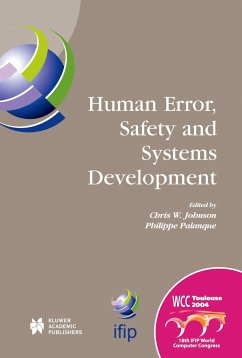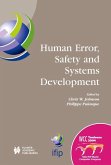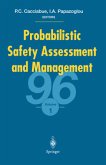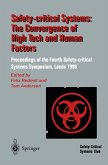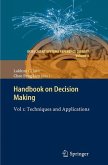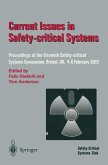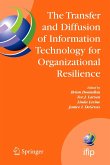Recent accidents in a range of industries have increased concern over the design, development, management and control of safety-critical systems. Attention has now focused upon the role of human error both in the development and in the operation of complex processes.
Human Error, Safety and Systems Development gathers contributions from practitioners and researchers presenting and discussing leading edge techniques that can be used to mitigate the impact of error (both system and human) on safety-critical systems. Some of these contributions can be easily integrated into existing systems engineering practices while others provide a more theoretical and fundamental perspective on the issues raised by these kinds of interactive systems. More precisely the contributions cover the following themes:
-Techniques for incident and accident analysis;
-Empirical studies of operator behaviour in safety-critical systems;
-Observational studies of safety-critical systems;
-Risk assessment techniques for interactive systems;
-Safety-related interface design, development and testing;
-Formal description techniques for the design and development of safety-critical interactive systems.
Many diverse sectors are covered, including but not limited to aviation, maritime and the other transportation industries, the healthcare industry, process and power generation and military applications.
This volume contains 20 original and significant contributions addressing these critical questions. The papers were presented at the 7th IFIP Working Group 13.5 Working Conference on Human Error, Safety and Systems Development, which was held in August 2004 in conjunction with the 18th IFIP World Computer Congress in Toulouse, France, and sponsored by the International Federation for Information Processing (IFIP).
Hinweis: Dieser Artikel kann nur an eine deutsche Lieferadresse ausgeliefert werden.
Human Error, Safety and Systems Development gathers contributions from practitioners and researchers presenting and discussing leading edge techniques that can be used to mitigate the impact of error (both system and human) on safety-critical systems. Some of these contributions can be easily integrated into existing systems engineering practices while others provide a more theoretical and fundamental perspective on the issues raised by these kinds of interactive systems. More precisely the contributions cover the following themes:
-Techniques for incident and accident analysis;
-Empirical studies of operator behaviour in safety-critical systems;
-Observational studies of safety-critical systems;
-Risk assessment techniques for interactive systems;
-Safety-related interface design, development and testing;
-Formal description techniques for the design and development of safety-critical interactive systems.
Many diverse sectors are covered, including but not limited to aviation, maritime and the other transportation industries, the healthcare industry, process and power generation and military applications.
This volume contains 20 original and significant contributions addressing these critical questions. The papers were presented at the 7th IFIP Working Group 13.5 Working Conference on Human Error, Safety and Systems Development, which was held in August 2004 in conjunction with the 18th IFIP World Computer Congress in Toulouse, France, and sponsored by the International Federation for Information Processing (IFIP).
Hinweis: Dieser Artikel kann nur an eine deutsche Lieferadresse ausgeliefert werden.

